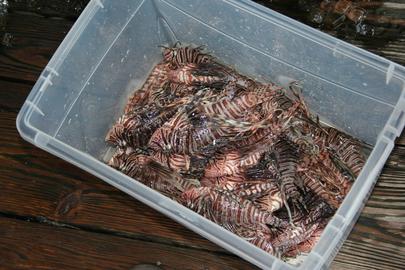Divers will return to Florida Keys waters next month on a mission: net thousands of dollars in cash and prizes while protecting the environment from invasive lionfish. REEF and the Florida Keys National Marine Sanctuary are hosting the second annual lionfish derby series starting May 14, in Long Key, Fla. In 2010, the inaugural series of lionfish derbies removed 664 of the Pacific invaders from sanctuary waters. “Anyone who appreciates the diversity of the Keys coral reef should be concerned about these invasive fish,” said Sean Morton, Sanctuary Superintendent.
This paper explores detectability rates of lionfish using underwater visual census methods such as belt transects and stationary visual census. Knowing the error in these methods specficially for lionfish is necessary to help study this invasive species in the western Atlantic.
Predicting and mitigating the effects of invasive Indo-Pacific lionfish Pterois volitans on Caribbean fish communities requires a thorough understanding of the species’ predation behaviour in the invaded range, including the types and amounts of prey consumed and how foraging patterns vary in relation to extrinsic conditions. We studied the activity levels and prey consumption rates of lionfish on 12 shallow coral reefs in the Bahamas in relation to time of day and prey availability.
The authors of this study examined drivers of public involvement and success at invasive removal in tournaments (derbies) to catch Indo-Pacific lionfish (Pterois volitans/miles) in the Western Atlantic. Information on 69 lionfish derbies held in the wider Caribbean region from 2010 to 2015 was compiled, including REEF Lionfish Derbies. The authors found that the number of lionfish caught increased with effort and with time since lionfish were established in an area.
REEF announces the release of "The Lionfish Cookbook", available for $16.95 online at http://www.reef.org/catalog/cookbook. The book is a unique blend of 45 tantalizing recipes, background on the lionfish invasion and its impacts, as well as information on how to safely catch handle and prepare the fish. Invasive lionfish are a new threat to western Atlantic, Caribbean and Gulf of Mexico waters.
The impacts of invasive lionfish (Pterois volitans/miles) on native coral reef populations in the Western Atlantic Ocean and Caribbean Sea can be enormous. However, how much lionfish differ from native predators and whether their effects outweigh the abundant mesopredators that occupy many reefs invite continued examination. The authors of this paper present empirical evidence from Caribbean Panama and beyond, suggesting that lionfish are less abundant than native mesopredators (e.g. small seabass).
The impacts of invasive lionfish (Pterois volitans/miles) on native coral reef populations in the Western Atlantic Ocean and Caribbean Sea can be enormous.
REEF is working in close partnership with the Florida Keys National Marine Sanctuary (FKNMS) to diligently track lionfish reports and initiate removal efforts in South Florida. The first confirmed lionfish in the Florida Keys was reported and captured within 24 hours in January 2009 (see previous enews article). Subsequent early reports in March-June were met with successful rapid response.
REEF is working in close partnership with the Florida Keys National Marine Sanctuary (FKNMS) to diligently track lionfish reports and initiate removal efforts in South Florida. The first confirmed lionfish in the Florida Keys was reported and captured within 24 hours in January 2009 (see previous enews article). Subsequent early reports in March-June were met with successful rapid response.




